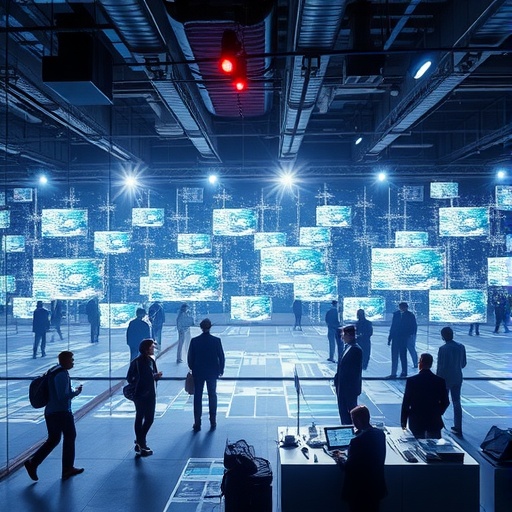In an era defined by rapid technological transformation and evolving patterns of media consumption, understanding the shifting contours of the news landscape has never been more critical. Gary Kebbel, an esteemed American journalist and professor with extensive experience across both traditional print journalism and cutting-edge digital platforms, offers a comprehensive exploration of these changes in a forthcoming public lecture. As an influential figure whose career has spanned prominent roles such as Night Graphics Editor at USA TODAY, Home Page Editor at Washington Post.com, and Director of AOL News, Kebbel is uniquely positioned to provide nuanced insights into the future of news dissemination and audience engagement.
The media terrain of the 21st century is characterized by a convergence of digital innovation and heightened audience expectations. Newsrooms today grapple with the demands of immediacy, accuracy, and interactivity, amid an information environment saturated with content and rife with misinformation. Kebbel’s lecture promises to dissect the technological advancements that have redefined how journalistically vetted content is produced, presented, and consumed, revealing the interplay between evolving algorithms, platform dynamics, and human editorial judgment.
Central to Kebbel’s analysis is the role of technology in bridging the gap between newsrooms and their audiences. The proliferation of mobile devices and social media platforms has shifted the locus of news consumption away from traditional broadcast and print mediums toward personalized, on-demand, and interactive experiences. Through his work—including founding the MobileMe&You Annual Conference on mobile media best practices—Kebbel has championed innovative strategies that enable journalists to harness mobile technologies effectively, ensuring stories are not only delivered efficiently but tailored to the contextual preferences of diverse audiences.
Moreover, the digital age has introduced complex challenges surrounding the verification of information and the mitigation of misinformation. Kebbel is expected to address how news organizations employ sophisticated tools such as artificial intelligence and machine learning to detect false narratives and enhance fact-checking processes. These technologies, when integrated with skilled editorial oversight, can fortify the credibility of news content, reinforcing the public’s trust in journalism—a cornerstone for a functioning democracy.
The dynamics of newsroom operation are also transforming internally. Legacy models anchored in hierarchical editorial workflows are giving way to more agile, collaborative approaches that leverage real-time data analytics and audience feedback mechanisms. Kebbel’s deep industry experience allows him to illuminate how newsrooms adapt structurally and culturally to navigate this new operational paradigm, balancing speed with accuracy and responsiveness with responsibility.
Audience engagement, too, is rapidly evolving via technological interactivity. News organizations now employ immersive storytelling techniques—incorporating multimedia elements, augmented reality, and interactive graphics—to create richer, more engaging narratives. Kebbel’s history as Night Graphics Editor at USA TODAY provides him with a vantage point to discuss how visual storytelling elevates journalistic impact, making complex issues more accessible and compelling in the crowded information ecosystem.
Another critical facet Kebbel is anticipated to explore is the monetization models underpinning modern journalism. With traditional revenue streams such as print advertising diminishing, media entities are innovating subscription-based models, native advertising, and sponsored content, all while grappling with ethical considerations regarding editorial independence. His insight into these economic challenges will shed light on the sustainability of high-quality journalism amid shifting market forces.
The lecture will further examine how digital platforms influence the distribution and visibility of news content. Algorithms governing social media and news aggregators play a pivotal role in determining which stories reach audiences. Kebbel is likely to unpack the implications of platform control, echo chambers, and filter bubbles that shape public discourse, emphasizing the need for transparency and accountability in digital news ecosystems.
In addition, Kebbel’s discourse will address the global dimensions of the evolving media landscape. Cross-border information flows, cultural diversity among news audiences, and the implications of geopolitical factors on news reporting practices form a complex matrix that journalists must navigate. His expertise offers a rare perspective on the intersection between local relevance and global connectivity in journalism today.
Underlying all these developments is a tension between speed and verification, engagement and ethics. Kebbel is expected to offer strategic insights into how media professionals can balance these competing imperatives, ensuring that technological innovation enhances rather than erodes journalistic standards. His comprehensive approach underscores the necessity for ongoing education and adaptability among journalists to maintain public trust and fulfill their democratic mission.
The upcoming public lecture promises to be a seminal event for media scholars, journalists, and the informed public. Taking place onsite at the Communication Studio within the Social Sciences Building, as well as accessible online via Zoom, the session offers a timely opportunity to gain expert perspectives on navigating the rapidly shifting currents of contemporary news. Kebbel’s lecture will resonate deeply in an age where the capacity to discern truth amidst a flood of information is both a professional imperative and a public necessity.
For anyone invested in the future of media—whether practitioners, academics, or consumers—this engagement presents an invaluable chance to engage with one of the leading voices charting the course of journalism’s digital future. Kebbel’s synthesis of technological trends, operational challenges, and ethical considerations promises to equip attendees with knowledge essential to understanding and participating in the evolving information environment.
Subject of Research: The evolution of the U.S. media landscape and the role of technology in newsrooms and audience engagement
Article Title: Navigating the Future of News: Insights from Gary Kebbel on the Evolving Media Landscape
News Publication Date: September 9, 2025
Web References: https://bit.ly/navigating_the_news
Image Credits: Ateneo de Manila University
Keywords: Journalism, Media Technology, Newsroom Innovation, Digital Media, Audience Engagement, Misinformation, Fact-Checking, Multimedia Storytelling, Media Monetization, Algorithmic Distribution




